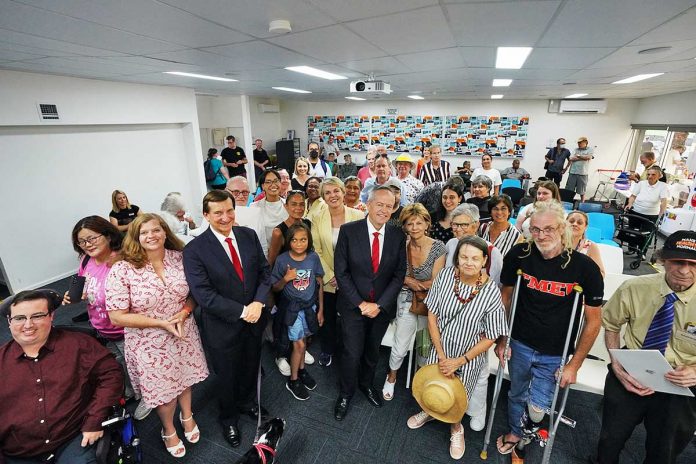Heartfelt stories and frank feedback about the National Disability Insurance Scheme (NDIS) at the Sydney NDIS Community Forum at Waterloo Neighbourhood Centre on February 1, prompted the Minister for the NDIS, the Hon. Bill Shorten MP, to admit that the NDIS needed to give control to the participant and personalise the relationship with the agency to build trust.
NDIS participants and advocates, disability service providers, community services staff, public housing tenants and other stakeholders packed the forum hosted by Federal MP for Sydney and Minister for the Environment and Water, Tanya Plibersek, with Mr Shorten, and State MP for Heffron, Ron Hoenig.
Mr Shorten said the Sydney forum was part of a nationwide community engagement process the NDIS Review team was undertaking to put people with disability back at the centre of the NDIS.
“I want to listen, answer questions and explain what we’re doing in the course of your observations and questions, hear your views – because I love the NDIS,” he said.
“I want the NDIS the very best it can be. I want to use the time we’ve got not just here today but in parliament to fool-proof the NDIS against idiots.”
Ms Plibersek said the NDIS was one of the best and biggest reforms that a Labor government had ever undertaken.
“It’s like Medicare. It’s huge. It’s life-changing,” she said.
But when the scheme was handed over to Tony Abbott’s Coalition government in 2013, its purpose was sullied by an emphasis on cost reduction and restricted access, she said.
“They took a beautiful idea and sucked the goodness out of it by treating it as though people with disabilities are just a cost to taxpayers.”
NDIS participant, Daniel, who’d campaigned for the scheme to be introduced, told the forum the NDIS was life changing and transformational. And yet, “My experience would be that NDIS over the years has been quite difficult.”
Those difficulties included long and costly battles with the Administrative Appeals Tribunal (AAT), including a recent appeal over funding for a shower commode and a new electric wheelchair needed because his present chair was several years old.
“What I find is, you spend all of this time preparing occupational therapy and other reports, very detailed documents, but there’s not any communication from the NDIS. I had the plan review meeting in July; I got an NDIS plan approved in November. Nothing I submitted to the NDIS was approved in my plan.
“They gave me half the money for a wheelchair. I wrote back to them and said, ‘Which half of the wheelchair do you want me to buy?’ Also, there was the money for the wheelchair but they didn’t fund the shower commode. So, I can have a wheelchair but I can’t have a shower.
“My question is, ‘What are you going to do so the NDIS is more user friendly and less combative?’”
Parents at breaking point
Parents of children with disabilities also made impassioned pleas for the scheme to be more supportive, accessible and flexible.
One mother, whose 36-year-old daughter was deaf and suffered with other serious medical conditions and physical disabilities, said she’d felt distressed during three years of scrutiny from the AAT.
“I can’t understand why we are treated like big game hunters who are really trying to rip off the system.
“This is the third year where we’ve fought the AAT and we’re still being scrutinised and still being asked for more information when our daughter’s condition has not changed and, unfortunately, is not likely to change.
“A lot of the parents in this room are at breaking point because we’re not getting any younger and we have the prospect of a child whose future is very grim.
“We’re being punished for being parents of children with disability.”
Other forum participants identified a two-tier system where disadvantaged people with fewer resources received less support from the NDIS.
“It seems to be the more middle class, the more white and the more Christian you are, you get all of the things, and if you aren’t that, you get squat – and it’s really scary,” said one speaker.
Rebuilding trust
Mr Shorten said he acknowledged that, while not everyone in the scheme had to go through it, “The traumatising, stressful nature of disputation … has been a source of a major contribution to a complete lack of trust in the system.”
He said, “I want the NDIS to have a great reputation both to the people who use it and the taxpayers who fund it. And I think we do that through co-design and empowering people.”
Six months into his ministry, he said he realised strengthening the NDIS required work on multiple fronts, which included but was not limited to: getting the planning process right through upskilling NDIS planners and streamlining decision making, establishing an alternative dispute resolution process (involving mediators rather than lawyers), setting up longer-term plans for participants, and making timelier decisions about home modifications, assistive technology and accommodation.
“You shouldn’t need a lawyer to sort out dealing with the NDIS,” he said.
_______________
To contribute to the NDIS Review or for more information visit https://www.ndisreview.gov.au/
The Independent Review Panel will provide a final report to the Disability Reform Ministers’ Meeting by October 2023.





